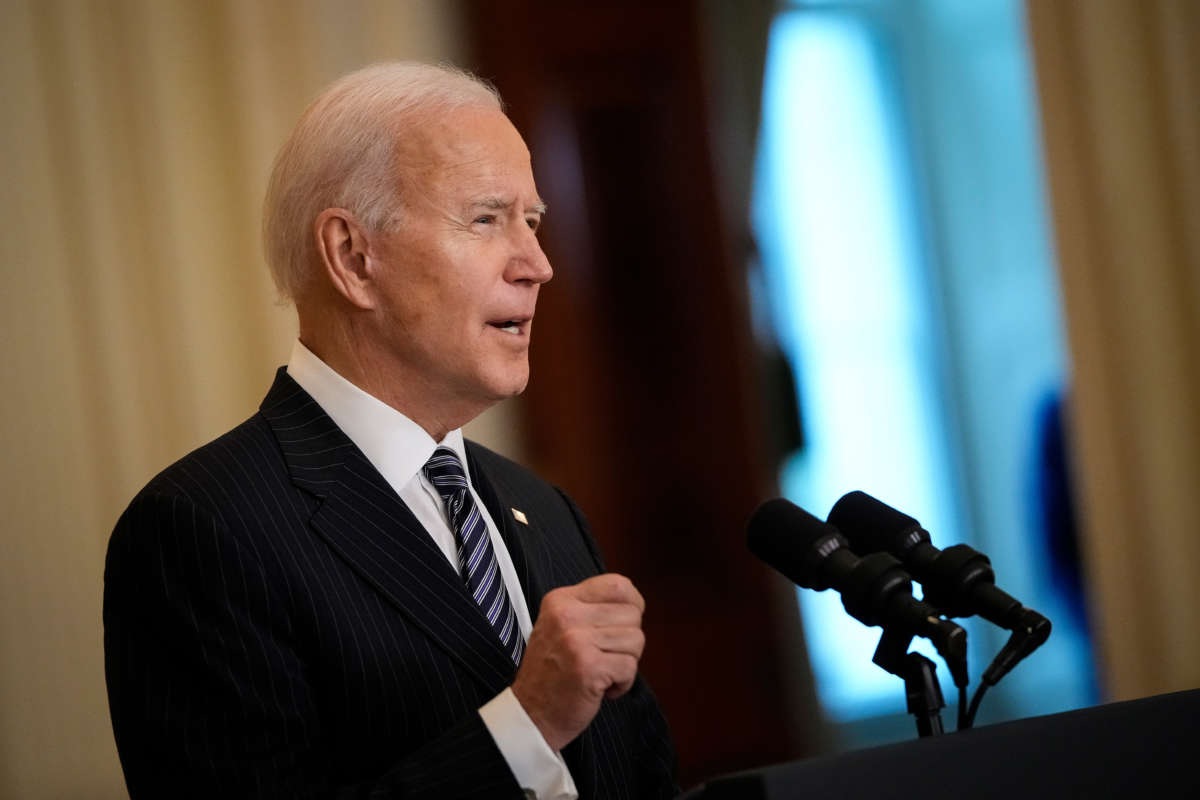Truthout is a vital news source and a living history of political struggle. If you think our work is valuable, support us with a donation of any size.
At the first press conference of his presidency on Thursday, President Joe Biden announced a new COVID-19 vaccination goal for the U.S. His administration is now aiming for 200 million vaccine doses administered by April 29, which will mark his 100th day in office.
Last week, the U.S. surpassed the administration’s previous goal of 100 million doses in the first 100 days of Biden’s presidency at the 58 day mark. Biden’s administration has now doubled that goal, estimating that the U.S. will be able to hit 200 million by the end of his first 100 days.
“Today I’m setting a second goal,” Biden said. “We will, by my 100th day in office, have administered 200 million shots in people’s arms.”
Biden previously hinted at this goal last week. With about 2.5 million doses a day being administered in the U.S. and a surge in vaccine supplies expected to come soon, the 200 million goal is well within reach. As of Thursday, over 130 million doses have gone into American arms.
This uptick in the pace of vaccine administration is promising, especially as the U.S. tries to stem the potential spread of more transmissible variants of the virus.
Uncompromised, uncompromising news
Get reliable, independent news and commentary delivered to your inbox every day.
If the population could reach herd immunity at, say, 85 percent, as health experts like Dr. Anthony Fauci, Biden’s top medical adviser on COVID-19, have suggested, the U.S. could reach that threshold by the end of August at the current rate of 2.5 million doses administered per day. But that goal of 85 percent vaccinated in the U.S. may prove difficult to reach, however, as officials face the roadblock of vaccine hesitancy even among members of Congress.
Though the president’s new goal may be promising to those living in the U.S., many have criticized Biden and his administration for forgoing the needs of other countries, especially poorer countries, in prioritizing the U.S. Biden even bragged a bit about the U.S.’s competitiveness on vaccines during the press conference: “I know it’s ambitious, twice our original goal, but no other country in the world has even come close, not even close to what we’re doing.”
The U.S. and other wealthy countries have come under fire for their staunch opposition to vaccine intellectual property rights that are preventing other countries from being able to obtain the vaccines. South Africa and India are leading a push at the World Trade Organization to get these rights waived so that countries that don’t have access to the vaccine can manufacture and distribute it themselves — a proposal that has the backing of nearly 70 percent of adults in the U.S.
The intellectual property rights give pharmaceutical companies near-monopolistic control over their vaccines, which creates unnecessary shortages, argue advocates and politicians. Advocates point out that it’s especially unfair to allow these companies to hoard resources for profit when vaccines like Moderna’s were largely publicly funded. Despite pressure from other countries and human rights groups, however, Biden has not budged so far on his opposition to the waiver.
Countries like the U.S. and U.K. are also hoarding the vaccines themselves, buying enough doses to immunize their respective populations multiple times over. As of December, the U.S. had bought enough to cover all Americans four times over, and the Biden administration has brokered several deals to buy hundreds of millions more since then. Meanwhile, as of February, nearly 130 nations have yet to administer a single dose, according to the United Nations International Children’s Emergency Fund.
As vaccine manufacturing and distribution reach month four in the U.S., inequities in access to health care within the system are becoming more and more apparent. People without access to the internet or a car, for example, or people with disabilities and people who don’t speak English are at a clear disadvantage when it comes to scheduling their vaccination appointments.
And, though many states have opened up their vaccine eligibility to essential workers, many states are still refusing to let undocumented workers get vaccinated, despite the fact that undocumented workers make up a large share of the agricultural workforce.
Meanwhile, racial disparities in vaccine administration have continued partially because of inequities in access to transportation and flexibility of work schedules. As of earlier this month, according to The New York Times, the vaccination rate for Black people was half of that of white people. The disparity was even wider between white and Latino people.
A terrifying moment. We appeal for your support.
In the last weeks, we have witnessed an authoritarian assault on communities in Minnesota and across the nation.
The need for truthful, grassroots reporting is urgent at this cataclysmic historical moment. Yet, Trump-aligned billionaires and other allies have taken over many legacy media outlets — the culmination of a decades-long campaign to place control of the narrative into the hands of the political right.
We refuse to let Trump’s blatant propaganda machine go unchecked. Untethered to corporate ownership or advertisers, Truthout remains fearless in our reporting and our determination to use journalism as a tool for justice.
But we need your help just to fund our basic expenses. Over 80 percent of Truthout’s funding comes from small individual donations from our community of readers, and over a third of our total budget is supported by recurring monthly donors.
Truthout has launched a fundraiser to add 432 new monthly donors in the next 7 days. Whether you can make a small monthly donation or a larger one-time gift, Truthout only works with your support.
